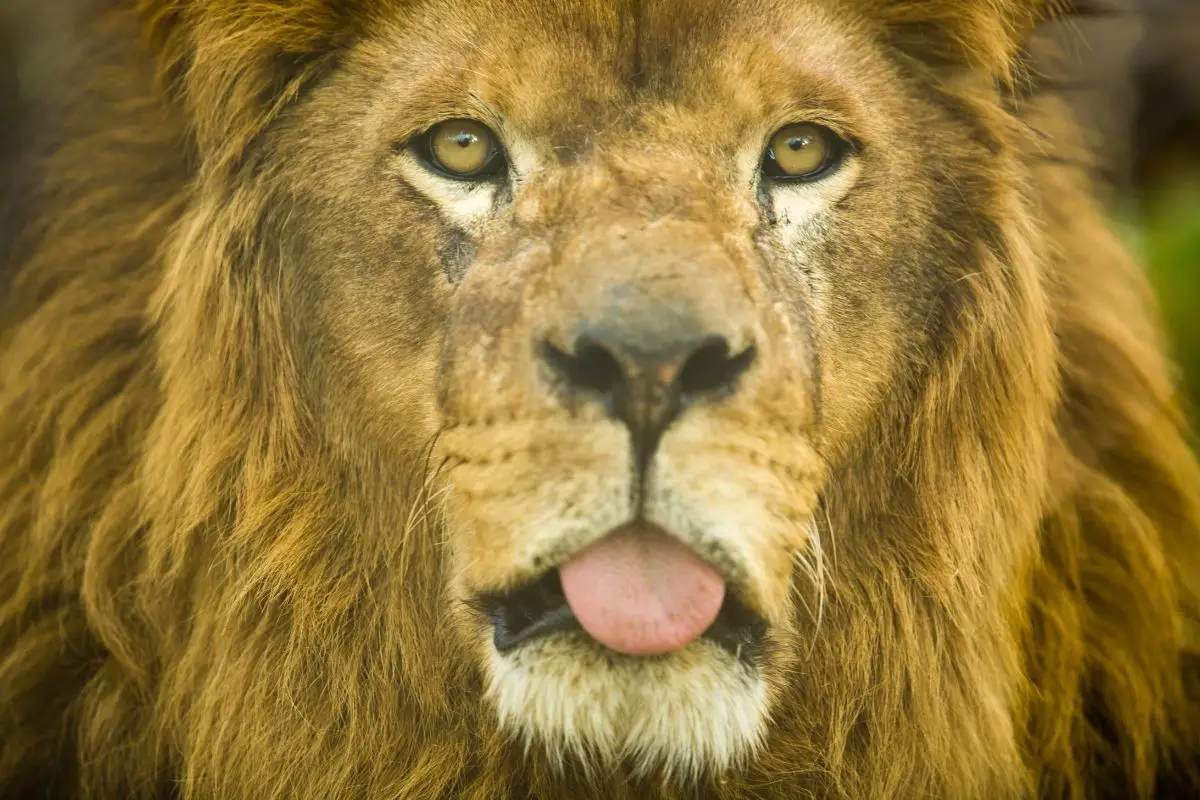Lions have a lot of interesting biological features that they have evolved over hundreds of years.
Each part of their biology is designed to help them in some way so they have a better chance of survival and passing on their genes, continuing their species.

One of the most interesting things about lions is their tongues. They are super rough and many have compared the tongue of a lion to sandpaper.
So, why do lions have such rough tongues and how does it benefit them?
Here we are going to be looking at lions and their tongues so you can understand how certain biological features help the survival of a species with just a few small changes.
So, let’s dive in!
Why Are Lions Tongues So Rough?
If a lion were to ever lick the back of your hand, the first thing you would notice is the pain.
Lions have very rough tongues because they are coated with little sharp spines with hook endings that face backwards.
These spines are known as papillae and act as barbs attached to the lion’s tongue which means that if you were to be licked by a lion, these sharp barbs would dig into your skin and tear it up.
They are what give the tongue of a lion its rough texture and makes being licked by a lion so painful.
Papillae are common features on a lot of animals tongues.
Even our own domesticated cats have papillae on their tongues – if you let your pet cat lick your hand, you will notice how it feels similar to rubbing sandpaper on your skin.
So, lions have rough tongues because they are coated with very small spines that grip and dig into the material that they lick – but why do lions have this strange biological feature and how can it be an advantage to them?
Why Lions Have Rough Tongues
There are a lot of advantages for a lion to have papillae on their tongues, but there are two main ones that make it a biological feature that they want to continue passing down to future generations.
Improved Grooming

The first reason is that the papillae on a lion’s tongue is great for picking up and removing dirt from a lion’s fur.
Unlike us, lions are coated in a layer of fur which, like a lot of mammals, they use to their advantage when it comes to camouflage for hunting and protection against harsh sunlight.
However, their fur also picks up a lot of dirt and debris that can encourage bacteria growth after long periods of time.
Bugs also cling to lion’s fur and this makes it easier for parasites to cling onto and be carried by lions.
So, lions need to clean their fur coats to stay happy and healthy. However, there is an issue.
Lions don’t exactly have bathtubs where they can clean their coats.
Any lakes or rivers are probably home to a lot of other dangerous creatures, like crocodiles or hippopotamuses, that are a threat to lions.
So, to clean themselves, a lion will lick their own coats or groom others like their cubs.
The papillae on a lion’s tongue makes cleaning their fur coats a lot easier as these barbs pick up dirt and debris much more easily than a smooth tongue would.
This means that a lion can like themselves clean.
They also help loosen any bugs or parasites that are making their home in the lion’s fur, so it also helps a lion’s health by ridding them of parasites.
Domestic cats use their tongues for the same purpose – which is why you don’t have to give your domestic cat a bath as often as you would a pet dog.
So, papillae on a lion’s tongue is partly used to help protect a lion from disease and bacterial infections.
They can remove dirt and debris from the lion’s coat, keeping them clean and healthy throughout their life.
Feeding
The second reason why the papillae on a lion’s tongue is so important is because it helps them scrape up even more meat from bones.
This means that lions do not miss out on vital nutrition that could mean the difference between life and starvation.
Lions can go days without eating because not every hunt results in success.
Because of this, meals are scarce and every pride member usually ends up sharing the same prey.
Every lion wants to eat as much as possible during each feeding session because they don’t know how long it will take to get another successful hunt – so the papillae on their tongues help ensure that every bit of meat is gobbled up.
This is why if you let a lion lick your hand enough times, you won’t be left with any skin!
Their tongues are designed to scrape up every bit of meat from bones and a lion is able to lick your hands until all that’s left is the bones.
It’s a terrifying fact, but also pretty cool – and just goes to show how every part of an animal’s biology is designed to help them survive.
Without their papillae, lions will be more likely to starve or be malnourished.
Papillae can also help a lion lap up more water while drinking so it helps them stay hydrated for longer.
This is especially important because sometimes, even going for a drink can be deadly to lions.
Crocodiles like to sneak up on their prey and pull them in when they bend down to drink from a river, so the papillae on a lion’s tongue can help them get a drink and get out of there fast!
Conclusion
So, lions have rough tongues because they have lots of tiny barbs known as papillae.
Papillae help out lions in lots of ways, including scraping more meat off the bones of their prey and by loosening dirt and bugs from their fur, helping a lion improve their chances of survival!
- Sink Your Teeth Into This: Analyzing the Powerful Lion Bite Force - September 8, 2023
- Siberian Tigers: Everything You Need To Know - September 4, 2023
- Do Lions Eat Humans? Understanding Lion Aggression and Risks - September 4, 2023








